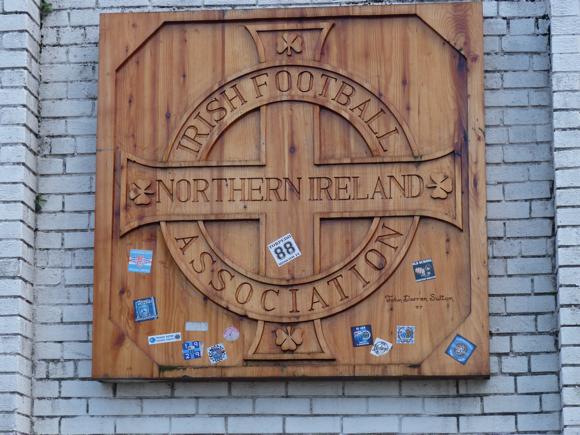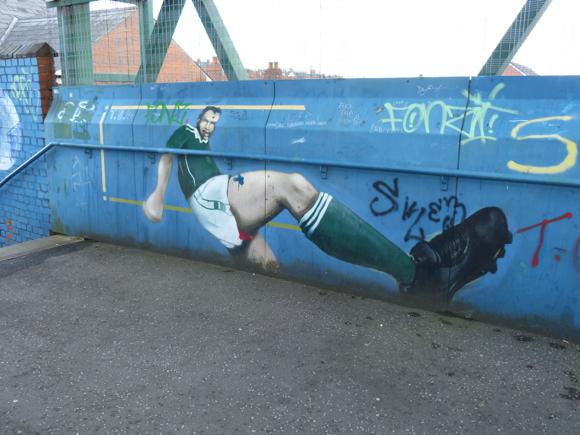On the eve of the draw for Euro 2016, signalling Northern Ireland’s return to the big stage after 40 years, a new documentary honours the side that starred at the 1958 World Cup. Peter Doyle reports.
From being humbled by lowly Luxembourg in 2013 to qualifying in style for Euro 2016, Michael O’Neill’s Northern Ireland are a team transformed.
After his side finished top of group F with six wins from ten games, tomorrow in Paris manager O’Neill will see which three teams his men first face in the finals in France next June.
But O’Neill’s side will have to go some to match what many fans consider to be the country’s best ever team – the 1958 World Cup squad, whose achievements have recently been immortalised on the big screen.
Documentary ‘The Spirit of ’58’ tells how these international minnows not only beat twice world champions Italy to qualify for a first-ever major tournament but also had to overcome unforeseen hurdles – not least opposition from zealots inside their own camp. For religious reasons, some were firmly against the idea of the side travelling to Sweden to play World Cup matches on a Sunday.
At that time, it had been the policy of the Irish Football Association not to play matches on a Sunday so as not to upset the God-fearing Sabbath observers around the province.
Filmmaker Evan Shaw describes ‘The Spirit of ’58’, which premiered at the Belfast Film Festival this summer, as a ‘love letter’.
He added: ‘It’s rather timely right now. Reaction to the film has been fantastic’.
Shaw’s documentary captures all the drama from that tournament, with contributions from the five surviving members of the 1958 squad: Billy Bingham, Harry Gregg, Jimmy McIlroy, Peter McParland and Billy Simpson.
Captained by Danny Blanchflower, Northern Ireland had qualified for Sweden with a 2-1 win in Belfast. Opponents Italy included Juan Schiaffino and Alcides Ghiggia, World Cup winners with Uruguay in 1950.
Three weeks later, goalkeeper Harry Gregg was pulling his Manchester United teammates from a burning plane in Munich. In the air disaster that claimed eight of the Busby Babes, Blanchflower’s younger brother Jackie was so badly injured he would never play again. His last international was the win over Italy.
From the horror of Munich, as Shaw’s documentary reveals, within four months Northern Ireland came within one match of facing Pelé’s Brazil in the semi-final of the 1958 World Cup.
It was a remarkable feat. Key to it was the gruelling 2-2 draw in the group stage against world champions West Germany, Gregg performing further heroics in goal.
Tied on three points with Czechoslovakia, Northern Ireland needed extra-time to beat the Czechs 2-1 in a play-off that paved the way to the quarter-finals.
But it was a match too far for the beleaguered squad. Gregg, later named goalkeeper of the tournament, had been crocked keeping the Germans at bay. His replacement, Norman Uprichard, not only twisted an ankle but broke a hand in the play-off, forcing Gregg to ditch his walking stick and pick up his goalie gloves once again. His bandaged-up ankle ligaments no doubt played a big part in the 4-0 defeat to France in the quarter-final.
Northern Ireland bowed out, gone but not forgotten– and now celebrated on celluloid.
Shaw hopes to make a similar documentary charting Northern Ireland’s World Cup campaigns in the 1980s, during which they defeated home nation Spain 1-0 in Valencia in 1982, thanks to a Gerry Armstrong strike, as well as facing Brazil and Spain again at Mexico 1986.
‘The idea,’ says Shaw, ‘is to screen this at the next Belfast Film Festival in the spring’.
As for 1958, perhaps it was best summed up by Danny Blanchflower himself: ‘In years to come, when we reflect with the judgement and enchantment that distance lends to these things, we may marvel at the almost impossible feats we achieved’.
A book based on the Spirit of ’58 will be published by Blackstaff Press in May 2016.




